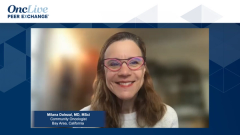
Patient Profile 1: Second-Line Therapy for HER2+ mBC
Expert perspectives on the selection of second-line therapy when patients progress with HER2+ metastatic breast cancer.
Transcript:
Neil Iyengar, MD: Let's move on and hear about what happened next. It sounds like she subsequently went on to develop brain metastases.
Milana Dolezal, MD, MSci: Unfortunately, she then developed brain metastases. She did come in with a minor headache after asking. You don't know unless you ask.We scanned her brain, and unfortunately, she did have 2 different areas of brain metastases. She was symptomatic with the headache, but no other concerning symptoms in terms of edema or other impending doom types of things. I referred her to the radiation oncologist where she underwent gamma knife SRS [stereotactic radiosurgery]. I think over the course of her history, she's probably had SRS maybe 7 or 8 times because she's continued to develop brain metastases. We did have discussions about what therapy to go on and she was very comfortable having her hair back and thinking about next-line therapies. In her case, I went a little bit outside the box in terms of using neratinib [Nerlynx] and [capecitabine] Xeloda. The NALA data had been out, but not FDA approved yet at that point.
I recall Adam Brodsky had at ASCO [American Society of Clinical Oncology] a third line HER2 [human epidermal growth factor receptor 2] space session in talking about, ‘What do you do in the third line space at this point?’ Actually, I transitioned her to neratinib, which was approved at that point in the extended adjuvant setting. The approval was 2020 for the NALA data in the third-line setting. We tried Xeloda with the idea that there's going to be hopefully some blood-brain barrier penetration where chemotherapy gets up into the brain. We know that those cells are HER2-positive and what TKIs [tyrosine kinase inhibitors] we have out there. Now, lapatinib [Tykerb] has been available for a long time in that space. My experience with lapatinib is diarrhea and rash and some of the – doesn’t play well with hepatitis medications and hepatitis itself in terms of LFTs [liver function tests]. That's why I chose neratinib. I had a lot more recent experience in the extended adjuvant setting, and I knew the NALA data was out there. That went OK. I think the calendar was confusing for her to be taking all these different medications. And then the challenge in the metastatic setting, as opposed to the extended adjuvant setting, is really dose escalation of neratinib in terms of tolerability of diarrhea. The control trial has really revolutionized how we do neratinib dose escalation in terms of starting slow with a ramp-up. But in the metastatic setting, you have to ramp up quickly. This patient had a lot of diarrhea and was working on her calendar, but she almost came back and threw the pills in my face in terms of being so frustrated with all of it.
At that point, we had segued into SBRT [stereotactic body radiation therapy] gamma knife. And then we went to T-DM1 [trastuzumab emtansine], which is more in your typical second-line setting. I gave the TKI a shot, but tucatinib hadn't been approved yet. And the HER2CLIMB data, which is phase 3 data, hadn't been publicly available or really reported on yet.
Neil Iyengar, MD: The diarrhea can certainly be tough. And I think you raised some important points regarding to prophylaxis and findings from the control study. I certainly also use the ramp-up approach, the dose-escalation approach, with neratinib, which of course, was the most successful approach, at least in the control trial.
Transcript edited for clarity.








































